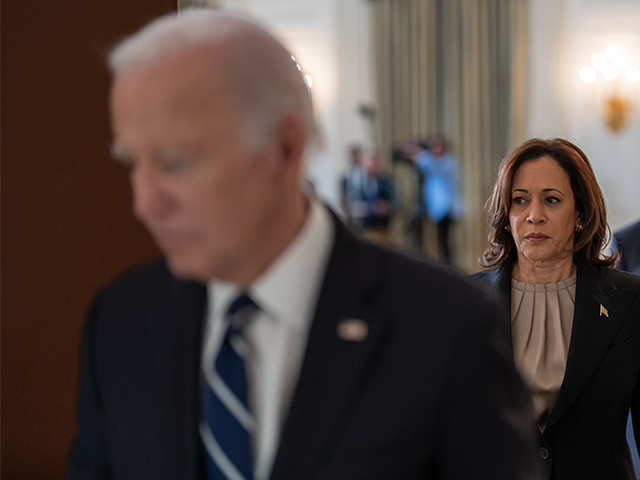Breitbart Business Digest: Depressed Consumers Are Bad News for Kamala Harris
 Official White House Photo by Lawrence Jackson via Flickr
Official White House Photo by Lawrence Jackson via Flickr
Kamala Harris Should Be Very Worried About the Consumer Sentiment Slump
Kamala Harris should be very worried about consumer sentiment. Unless she can inspire a sharp increase in economic confidence, she is likely to lose the presidential election in November.
The University of Michigan’s survey of consumer sentiment fell to an eight-month low this month. It has declined in four out of the last five months. For the last three months, it has been virtually unchanged at a low level rarely seen outside of a deep economic downturn.
Many of the election models—either formal models like those employed by 538 or the informal mental models many pundits carry around in their heads—tend to overestimate the influence of objective economic measures. They count things like the unemployment rate, income growth, or broad economic growth as “fundamentals” likely to influence the election when these things only indirectly and variably sway votes through the medium of sentiment.
A big problem with trying to use objective economic data in prediction models is that the weight consumers assign to different data change. Sometimes consumers care a lot about employment and very little about inflation. Sometimes—like now—inflation is considered much more important, and jobs are an afterthought.
This is often extremely frustrating to partisans of incumbents who think the public should be more appreciative of their candidate’s or their party’s record. In this election cycle, for example, we’ve heard almost daily about how the public’s downbeat view of the economy is “a mystery,” an artifact of partisanship, probably going to change any day now, or even—incredibly—created by a media biased against the Democrats.
As it turns out, feelings don’t care about your facts. The virtue of looking at consumer sentiment surveys is that they incorporate the variability in the public’s weighting of economic data. Joanne Hsu, the director of the University of Michigan survey, tells us that in the latest survey “high prices continue to drag down attitudes” despite the fact that “labor market expectations remain relatively stable.” The survey doesn’t try to tell consumers that they are wrong to care so much about inflation—it just tells us that they are down on the economy because they care so much about inflation.
It’s actually relatively uncommon for consumer sentiment to be falling so sharply and consistently in an election year. Typically, consumer sentiment is near its cyclical peak in election years, giving a big boost to incumbents or incumbent party candidates. The exceptions, when consumer sentiment was at or near a recent low in an election year, stand out: there was the Carter-Reagan election of 1980, the Bush-Clinton election of 1992, McCain-Obama in 2008, Clinton-Trump in 2016, and Trump-Biden in 2020.
The historical pattern is clear. When consumer sentiment is near cyclical lows in an election year, the incumbent party’s candidate tends to lose—especially if the candidate is the sitting president. The last-minute substitution of Harris for Joe Biden complicates that but probably not by much. Voters are very likely to identify Kamala Harris with the policies responsible for their current economic circumstances.
Everyone Feels Worse About the Economy—Especially Democrats
Despite many claims that consumer sentiment is only low because Republicans have a partisan bias against Biden’s economy, the decline in sentiment this year cannot be explained by partisanship. The index of consumer sentiment for Democrats stood at 101.7 in January. In the latest survey, it has tumbled to 83, an 18.7 percent decline. For independents, it is down 19.8 percent. For Republicans, it has fallen by around 6.6 percent. So, the recent decline has been steeper for Democrats and independents than for Republicans.
As a result, views of the economy are far less divided than they were last year. Democrat views are now much closer to those of Republicans, and independents now have a dimmer view of the economy than Republicans did in February. America is uniting around the view that the economy is in poor shape.
Although the July sentiment score was not much changed from June, below the surface something with potentially big political implications unfolded. There was a very sharp decline in the expectations gauge among Democrats. This decline was almost entirely offset by an almost equal increase in expectations among Republicans. The obvious implication is that Democrats are becoming more pessimistic because they are less confident in the election, and Republicans more optimistic because they increasingly expect to win.
Consumers Predict Trump Will Win
Earlier this week, the University of Michigan released the results of it presidential election survey, which has been conducted over the past three months. Instead of asking consumers who they prefer to win or who they intend to vote for, the survey asks three different questions: who do you expect to win, who do you think would be better for the economy, and who do you think would be better for your personal finances.
On the first question—who do you expect to win—Trump came out ahead 48 percent to Biden’s 44 percent. On the question of who would be best for the economy, Trump got 40 percent, Biden 35 percent, and 20 percent said it would not make a difference. On personal finances, Trump led 39 to Biden’s 32 percent, with 23 percent in the no difference category.

President Donald Trump gives a fist pump as he walks across the tarmac on October 15, 2020, in Greenville, SC. (Official White House Photo by Shealah Craighead via Flickr)
A closer look at the responses to the question about personal finances really highlights the depth of revulsion and disillusionment Americans feel when it comes to the Biden-Harris economy. In every income quintile, more people say they expect Trump will be better for their personal finances than Biden. Trump has an eight-point lead in the the bottom quintile, a seven-point lead in the second quintile, just a two-point lead in the third quintile, a 12-point lead in the fourth quintile, and a four-point lead in the top quintile. In short, Trump leads across the economic spectrum but has his strongest support on the question of personal finance among the working class and the upper-middle class.
From “the bottom up and the middle out” Americans expect Trump will be better for their personal financial situation.
Source link

